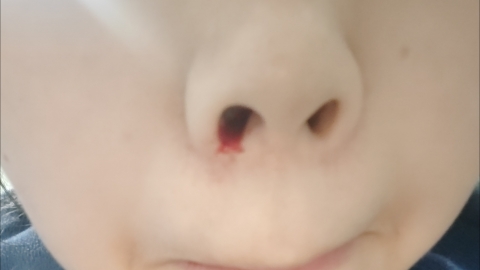How to stop a nosebleed
Generally, nosebleeds may be caused by factors such as dry air, physical impact, rhinitis, sinusitis, hypertension, and others. It is recommended to seek timely medical attention, identify the underlying cause, and then improve the condition through general treatments, medications, and other methods under a doctor's guidance. A detailed analysis is as follows:

1. Dry air: Low environmental humidity causes the nasal mucosa to lose moisture quickly, leaving it dry and fragile, which can easily lead to bleeding. This is commonly seen during autumn and winter. A humidifier can be used indoors to maintain humidity levels between 40% and 60%. The nasal cavity can also be moisturized daily with a saline nasal spray, and nose picking should be avoided.
2. Physical impact: A blow or pressure to the nose can cause blood vessels inside the nasal cavity to rupture, resulting in a nosebleed, which may be accompanied by nasal swelling and pain. Immediately apply pressure to both sides of the nostrils with your fingers for 5-10 minutes, keep the head slightly bent forward to prevent blood from flowing backward, and apply a cold compress to the nose within 48 hours to reduce swelling.
3. Rhinitis: Inflammation of the nasal mucosa causes congestion, swelling, and fragility, making nosebleeds more likely. Symptoms may also include nasal congestion and runny nose. Patients should use medications such as budesonide nasal spray, mometasone furoate nasal spray, and loratadine tablets as directed by a physician to alleviate inflammation and reduce nasal mucosal damage.
4. Sinusitis: Inflammation from the sinuses spreads to the nasal cavity, causing nasal mucosal erosion and exposed blood vessels, which can lead to nosebleeds, along with thick nasal discharge and headache. Patients should use medications such as cefuroxime axetil tablets, amoxicillin capsules, and fluticasone propionate nasal spray as directed by a physician to control infection and reduce nasal mucosal inflammation.
5. Hypertension: A sudden increase in blood pressure raises the pressure on blood vessels in the nasal cavity, making them prone to rupture. The bleeding can be heavy and difficult to stop. Patients should use medications such as nifedipine controlled-release tablets, valsartan capsules, and amlodipine besylate tablets as directed by a physician to stabilize blood pressure. Immediate medical attention should be sought during bleeding episodes, and nasal packing may be necessary to apply pressure and stop the bleeding.
In daily life, maintaining a regular routine, avoiding staying up late and emotional excitement, and reducing the risk of blood pressure fluctuations are recommended. A light diet, avoiding spicy and irritating foods, and drinking plenty of water help maintain the health of nasal mucosa.








